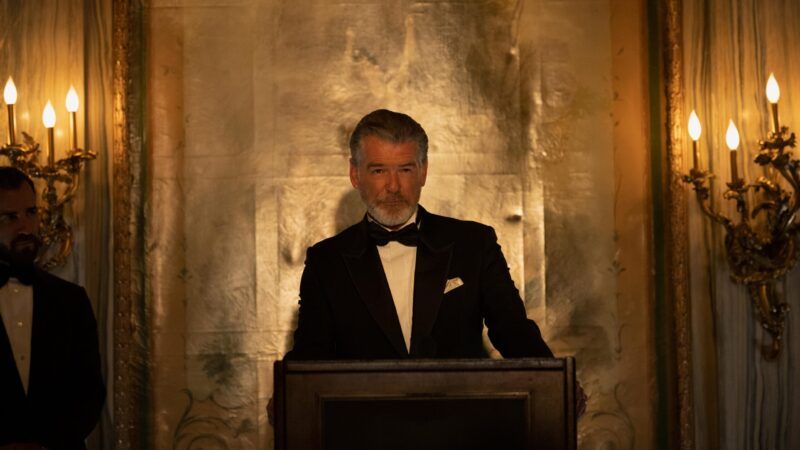Review: False Positive
The kids aren't all right.

False Positive begins with a scene of lurid promise: a shot of a blood-soaked woman wandering down an otherwise empty New York street. Since the cast—Ilana Glazer, Justin Theroux, Pierce Brosnan—and the cinematographer (Pawel Pogorzelski, who shot both Hereditary and Midsommar for director Ari Aster) bring substantial cred to the film, even if the three actors aren't horror stars, we settle in for some sort of cool surprise. Or at least something a little less nutty than what we eventually get here.
The picture was scripted by Glazer and director John Lee, who worked together on Glazer's Comedy Central show Broad City. It's an update of Rosemary's Baby, with the Satan-worshipping geezers of that film replaced by the sort of smug, manipulative men whose mission in life is to undermine women at every opportunity. I hear you groaning.
But since the story is set in the world of reproductive medicine, the movie's pointed feminist POV is unobjectionable and generally effective. When one familiar question comes up—"Does your doctor claim to know more about your body than you do?"—it stokes the plot and raises a real-world issue simultaneously.
As the movie gets underway, we meet a well-to-do Manhattan marketing whiz named Lucy Martin (Glazer) and her husband Adrian (Theroux), a surgeon. Lucy has been trying to get pregnant for two years with no luck. Adrian tells her he's going to take her to see Dr. John Hindle (Brosnan), one of the world's top fertility specialists. This is rather odd. Since Hindle was Adrian's mentor in medical school, and the two men have remained close, why didn't Adrian bring Lucy to see the older man much earlier—say, two years ago?
With his suave demeanor and distinguished beard, Hindle radiates professional eminence. But he's also a little weird. As Lucy reclines on an examination table with her knees spread, the celebrity medico, peering around beneath the sheet covering her lower body, addresses his comments to Adrian, who's hovering nearby. Injecting a huge syringe full of his signature pregnancy medication into Lucy, he says to Adrian, "This is good stuff."
The medication works almost too well. Lucy does get pregnant, but a sonogram reveals that she's carrying three babies: two males and one female. "I would strongly recommend keeping the boys," Hindle tells her, explaining that the female isn't strong enough to survive. (Men again!) But later, at home, Lucy tells Adrian she wants to keep the girl. Adrian reluctantly agrees to go along with her wishes, but late that night we see him sitting in a dark room furtively tapping at a laptop.
Since it's clear early on that there are no otherworldly elements in the story, we can probably dismiss as little in-jokes fact that "Adrian" is the name of Satan's son in Rosemary's Baby, and that "Wendy"—which is what Lucy wants to call her forthcoming daughter after disposing of the two boys in her womb—was the name of the girl who mothered the Lost Boys in Peter Pan. The actual reason for the gaslighting and other malign things going on in the film is not supernatural, but very much of-the-moment.
The movie gets crazier as it goes along, but it's not without virtues: Glazer especially, playing it straight, is appealing in a new way. But the picture would have been much improved by ending about 10 minutes before it actually does. This would have deep-sixed the boldly ridiculous concluding segment, which involves bizarre levitations and Dr. Hindle firing off lines like, "God doesn't make babies, I do!" The final scene, which is grotesque and preposterous at the same time, will someday surely be the answer to a film quiz question about the worst visual ideas in a mainstream movie.


Show Comments (5)